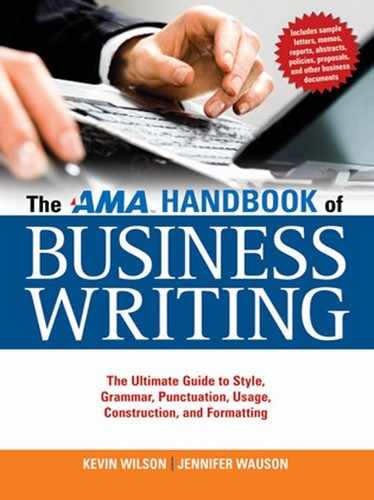O
OBJECT
The object is the part of a sentence that receives action.
Example: He threw the ball [direct object].
An object complement renames or describes a direct object.
Example: He named his monkey [direct object], Meep [object complement].
An indirect object identifies to what or to whom the action of a verb is directed.
Example: He sold me [indirect object] his car [direct object].
The word me—along with other pronouns such as him, us, and them—is not always an indirect object; it can also serve as a direct object.
Example: Save me.
OBJECT COMPLEMENT
OBJECTIVE CASE
OFF
Off is always used alone and not with of.
Incorrect: The ribbon was taken off of the package.
Correct: The ribbon was taken off the package.
OFFLINE
ON ACCOUNT OF
Avoid this phrase and use because instead.
ONE
One can be a determiner, adjective, or pronoun.
![]() Determiner—used before a proper noun to designate a particular person
Determiner—used before a proper noun to designate a particular person
Example: On September 1, did you make a phone call at 3:00 P.M. to one Horace Wauson?
![]() Adjective—used to modify the number of a noun
Adjective—used to modify the number of a noun
Example: I’ll have just one more piece of chicken.
![]() Pronoun—used as numerical expression or to stand in for the speaker or a generic average person
Pronoun—used as numerical expression or to stand in for the speaker or a generic average person
Example: One of the students will volunteer.
Example: If one tries hard enough, one can be anything.
The possessive form of one is one’s.
Example: One must learn from one’s mistakes.
In the United States, one’s is often replaced by his, her, or your.
Example: One must learn from his mistakes.
The reflexive form of one is oneself.
Example: If one skips lunch, one will find oneself very hungry by dinner.
The plural of one is ones.
Example: Which ones do you want?
ONE ANOTHER, EACH OTHER
ONLINE, OFFLINE
Online and offline are commonly written as one word, unless being used as an adverbial phrase.
Example: Is the printer online or offline?
Example: Mr. Smith used the computer at the library to go on line.
ONLY
Be careful of where you place this adverb; its position determines which word it modifies.
Incorrect: I could only get him to play one piece.
Correct: I could get him to play only one piece.
ONOMATOPOEIA
Onomatopoeia is a term used to describe words that suggest the sound being described.
Example: bang, bash, clang, clap, crackle, fizz, growl, honk, knock, mumble, ouch, plop, rattle, screech, smack, sniff, splash, thud, tinkle, twang, tweet, whiz.
OPEN
Open should be used without up.
Incorrect: We open up the doors promptly at noon.
Correct: We open the doors promptly at noon.
OPEN COMPOUNDS
ORDINAL NUMBERS
Ordinal numbers describe the order or sequence of something.
Example: first, 2nd, third, fourth, 50t.
Ordinal numbers can be written as words or abbreviations.
Example: 1st, first; 2nd, second; 3rd, thir.
Ordinal numbers usually appear before a noun.
Example: It was my parents’ 60th wedding anniversary.
OVER, MORE THAN
OXFORD COMMA
When listing a series of items in a sentence, a comma is inserted between each item, and a final comma is inserted before the word and and the last item. The last comma is called a “serial comma” or Oxford comma. Oxford commas are optional but recommended.
OXYMORON
An oxymoron is a figure of speech that occurs when two terms that appear to contradict themselves are combined.
Example: minor crisis, alone together, living dead, original copies, pretty ugly, definite maybe, rolling stop
